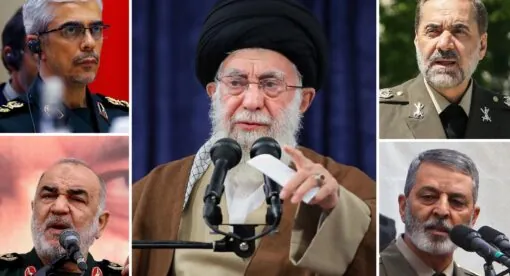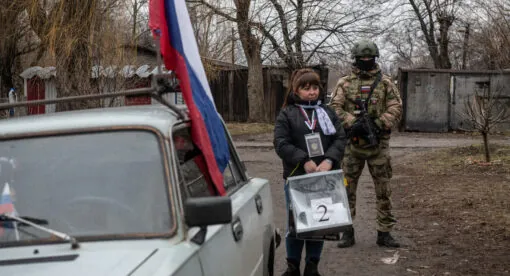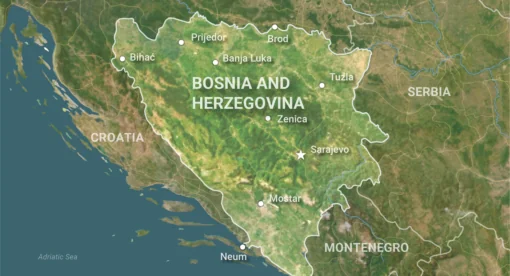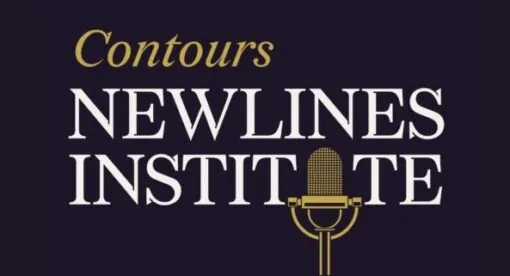The Weekly Forecast Monitor is a forward-looking assessment of geopolitical dynamics that are shaping the
international system. To get more in-depth analysis of these issues and learn more about analytical products from New Lines Institute — including simulations, training sessions, and forecast reports — contact us at [email protected] and visit https://newlinesinstitute.org/analytical-products/. Download PDF version.
Global Hotspot Tracker
The Global Hotspot Tracker examines the outlook for key geopolitical hotspots around the world. (Go to the Global Connectivity Tracker)
Middle East/North Africa Regional Tensions
Summary – Tensions in the Middle East increased this week as Israel and Hamas failed to reach a cease-fire agreement. Talks are expected to resume next week after the start of Ramadan. Fighting continued between Hezbollah and Israel, and plans for indirect talks to de-escalate the situation are believed to start in the coming weeks. In the Red Sea, al-Houthi fighters killed three Filipino crew members of a commercial ship and critically injured others in an attack.
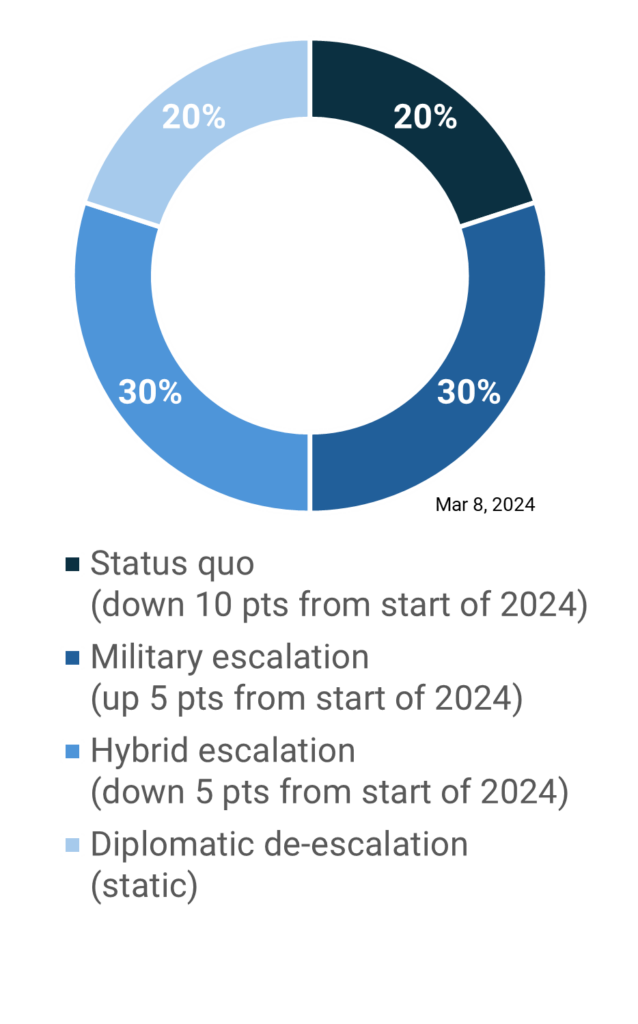
Military escalation scenarios
- Fighting between Israel and Hezbollah on Israel’s border with Lebanon continued to intensify.
Risk level – medium - India advised citizens living in northern Israel to move away from the Israel-Lebanon border after an Indian citizen working in the border area was killed by Hezbollah.
Risk level – medium
Hybrid escalation scenario
- An attack by al-Houthi fighters killed three crew members on a commercial ship in the Gulf of Aden.
Risk level – medium/high - Internet cables in the Red Sea were cut; the cause is still unknown.
Risk level – low
Diplomatic de-escalation
- Indirect talks between Lebanon and Israel will begin in the coming weeks, with the hopes of de-escalating Hezbollah-Israel tensions.
Opportunity level – low - Gaza cease-fire talks will resume next week after stalling this week.
Opportunity level – low
Russia/Ukraine Conflict
Summary – The Russia-Ukraine conflict is trending toward a hybrid escalation scenario as Ukraine continued drone attacks against Russian energy installations and Russia was accused of planning destabilization operations in Moldova to thwart the country’s EU accession plans. Yulia Navalnaya, the widow of Russian opposition leader Alexei Navalny, called for protests against President Vladimir Putin and Russia’s invasion of Ukraine on Mar. 17, the final day of the country’s presidential elections.
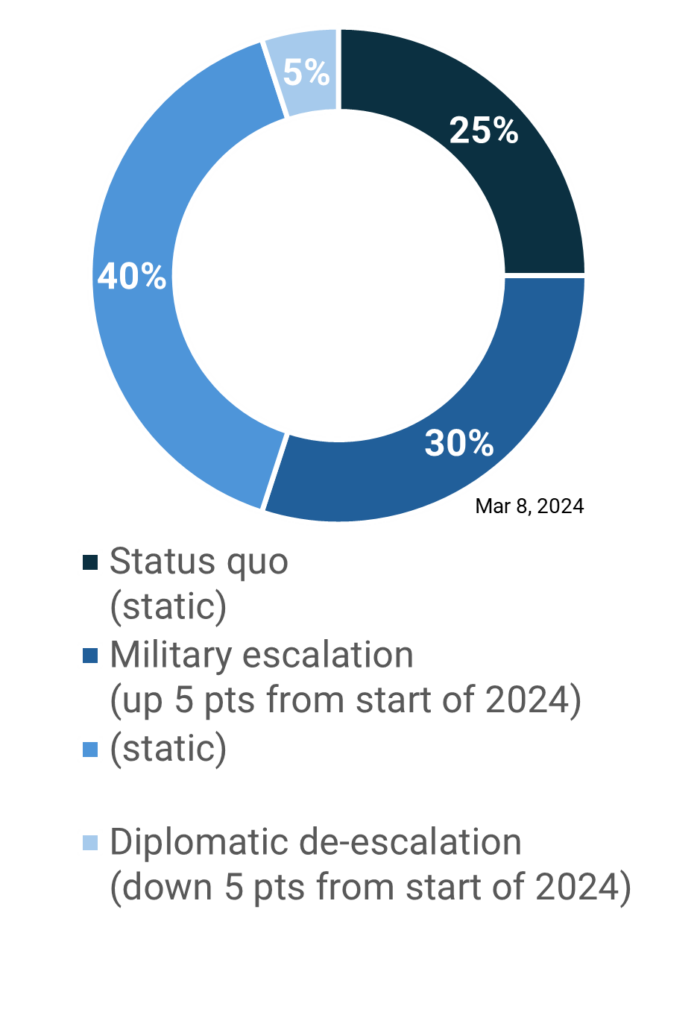
Military escalation scenarios
- A senior Russian military officer warned that the probability of the Ukraine conflict escalating into a war with Europe is increasing “significantly.”
Risk level – low - Ukraine sank a Russian patrol ship off the coast of Crimea in a sea drone attack.
Risk level – low - The European Commission announced the European Defense Industrial Strategy, which aims to boost spending and procurement for the EU defense market.
Risk level – low
Hybrid escalation scenario
- Ukrainian drones attacked fuel facilities at a Russian iron ore plant in the Kursk region and a Russian oil depot in the Belgorod region. Authorities in St. Petersburg announced increased security measures in the city after a drone crashed into an apartment building.
Risk level – low - The head of Moldova’s Intelligence and Security Service claimed Russia is planning destabilization operations in Moldova ahead of the country’s presidential and parliamentary elections in order to compromise its EU accession process. Moldova signed a defense agreement with France.
Risk level – medium - The U.K. is ready to loan frozen Russian central bank assets to Ukraine as surety for reparation payments at the end of war, Foreign Secretary David Cameron said.
Risk level – medium
Diplomatic de-escalation
- Russia and China issued a joint statement saying any discussion of a settlement to the Ukraine conflict would be impossible without Moscow’s participation.
Risk level – low - Ukrainian President Volodymyr Zelenskyy visited Turkey to discuss negotiating an end to the war. China’s special representative for Eurasian affairs visited Kyiv to promote a peace settlement.
Risk level – low
China/Taiwan/U.S. Tensions
Summary – Tensions among China, Taiwan, and the United States continued to trend toward hybrid and military escalation scenarios after China denied the existence of the median line dividing the Taiwan Strait and the Taiwanese defense minister stated the island was “on the brink” of increasing to a heightened alert level with China. Additionally, bills introduced by the U.S. Congress indicate possible hybrid escalation, as lawmakers sought to force Chinese company ByteDance to divest from TikTok.
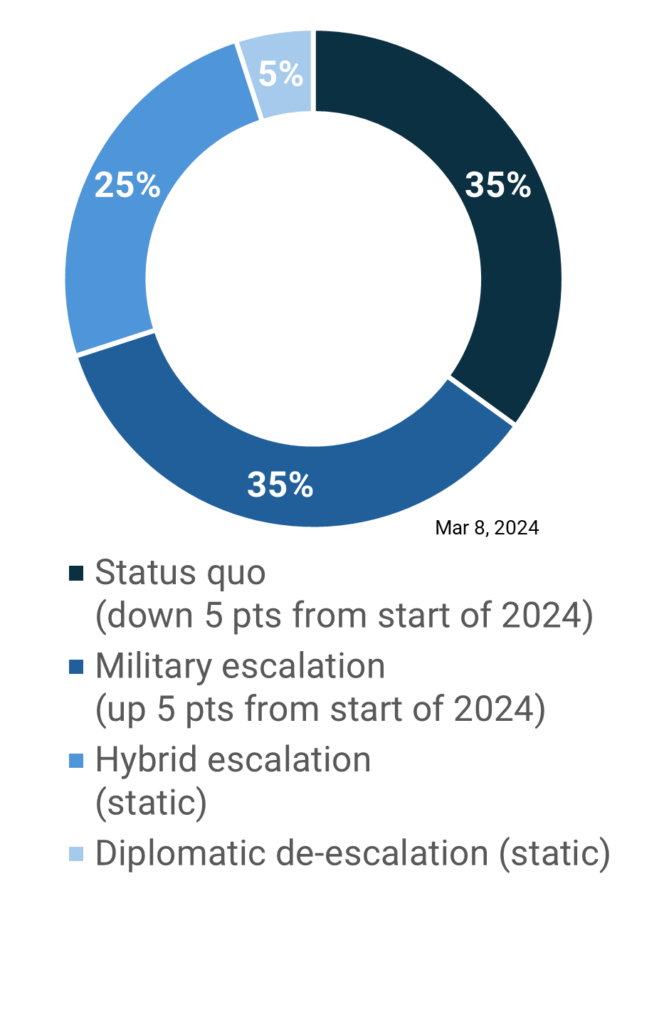
Military escalation scenarios
- Taiwanese Defense Minister Chiu Kuo-cheng told legislators the island was “on the brink” of a heightened alert level with China.
Risk level – medium - China stated it did not recognize the median line that splits the Taiwan Strait. The denial hints at possible increases in gray zone tactics and escalations. The U.S. has called for China to stop using intimidation tactics and engage in dialogue.
Risk level – medium/high - Tensions between the Philippines and China increased as two “minor collisions” were reported between the countries’ coast guards; the Philippines claims China deliberately rammed Filipino ships. Filipino coast guard members were injured after Chinese water cannons broke a Filipino vessel’s windshield.
Risk level – medium - There were reports of U.S. special forces being permanently stationed in Taiwan to provide training to Taiwanese special forces.
Risk level – low
Hybrid escalation scenario
- Chinese President Xi Jinping called on the military to integrate high technology into the armed forces in a move he said strengthens space, cyber defense, artificial intelligence, and joint operations capabilities.
Risk level – low/medium - A bill in the U.S. Congress would terminate the United States-People’s Republic of China Income Tax Convention in the case of a Chinese invasion of Taiwan. The bill demonstrates how military and hybrid escalation scenarios are not independent of one another.
Risk level – low - A bill in committee in the U.S. House of Representatives would give Chinese company ByteDance six months to divest from TikTok or else ban it from app stores.
Risk level – low
Diplomatic de-escalation
- No major indicators.
Global Connectivity Tracker
The Global Connectivity Tracker examines the impact of geopolitical dynamics on global energy security and the climate transition. (Go to the Global Hotspot Tracker)
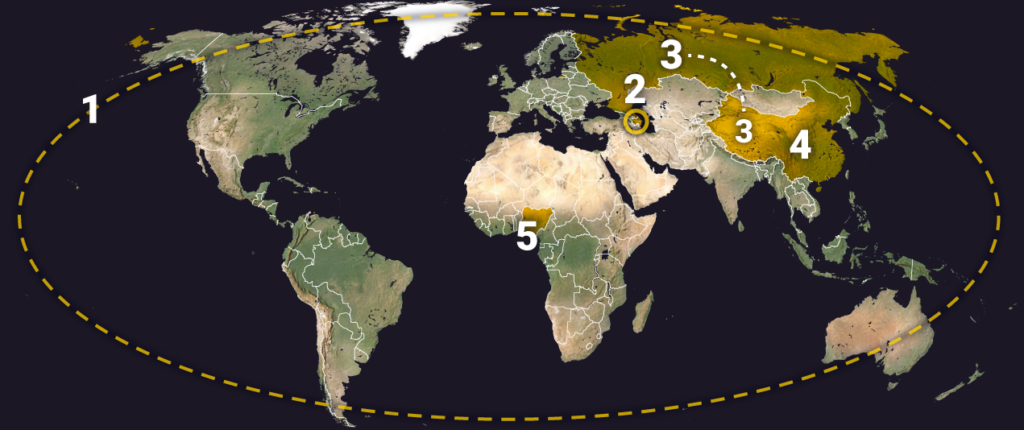
Energy/Climate
- Global
What happened: Worldwide emissions of carbon dioxide (CO2) from energy sources reached record highs in 2023, according to the International Energy Agency (IEA). This was largely due to the increased use of fossil fuels by countries whose zero-emissions hydropower production had been affected by droughts that had dried up rivers and reservoirs.
Significance/Outlook: As hydropower production declines due to droughts, the worldwide attempt to transition to renewable energy and meet climate targets set for 2030 could be at risk. This could threaten efforts to counteract global warming. The only way to achieve the targets established for controlling the increase in global temperatures and global warming and preventing uncontrolled climate change is to drastically reduce emissions of CO2 caused by burning fossil fuels. Although hydroelectricity is the most abundant renewable energy source, governments may be forced to switch to fossil fuels because of climate change-induced droughts and hot temperatures for energy security.
Risk level – low - Azerbaijan
What happened: Azerbaijan joined the global methane pledge, a voluntary pledge by nations to limit methane emissions. Azerbaijan is ready to join international efforts to reduce methane emissions by 30% by 2030.
Significance/Outlook: This methane reduction strategy helps minimize global climate change. Azerbaijan is actively promoting green goals and climate actions ahead of its hosting of the COP29 summit. Rapidly reducing methane emissions from energy, agriculture, and waste by at least 30% can contribute to limiting warming to 1.5˚C and improve human and environmental health, food security, and economy. The COP28 summit in UAE prioritized the reduction of methane, which is the second-largest greenhouse gas after CO2.
Opportunity level – low
- Russia/China/space
What happened: A nuclear power station could be set up on the moon sometime between 2033 and 2035, according to the president of Russia’s space agency Roscosmos.
Significance/Outlook: The two nations have been collaborating on a nuclear space energy initiative for the moon. One of the most important obstacles to overcome for people to be able to survive and thrive on the lunar surface is finding a reliable source of power. Solar panels would not be able to supply enough electricity to power future lunar settlements. Nuclear power, on the other hand, would be more than enough given the present circumstances. Practically, fission reactors can solve this problem. These nuclear reactors can be placed in areas with little or no sunlight for solar power and for long-duration missions.
Risk level – medium - China
What happened: China plans to reduce the energy intensity of its economy by 2.5% in 2024 as it faces significant economic challenges.
Significance/Outlook: This decision reflects a long-term energy trajectory the country has set to reduce energy consumption per unit of GDP and carbon emissions. These are the two main energy and climate goals the government is prioritizing in its current five-year-plan, which runs from 2021-2025. Over that period, it aims to cut emissions intensity by 18% and energy intensity by 13.5%. Beijing, however, missed its 2% target last year after continued increase in industrial and civilian energy consumption, which raises concerns globally over China’s role in the global fight against climate change.
Opportunity level – low - Nigeria
What happened: Shell plans to help the Nigerian government secure electricity for millions of households using renewables.
Significance/Outlook: Shell Nigeria PIc realizes the potential of the energy sector in Nigeria, especially in renewable energy. The plan is to provide Nigerians with off-grid energy sources from renewables, particularly in places that are not connected to the national grid. Sustainable financing from Shell will go toward cutting-edge technologies, innovation, and emission reduction operations. These investments will potentially assist with better access to energy at affordable prices which is key for Nigeria’s economic growth and development.
Risk level – medium
Key Stat of the Week
- Global emissions from energy rose 1.1% to 37.4 billion tons in 2023, according to the IEA
- U.S. energy-related emissions – fell by 4.1%
- EU energy-related emissions – fell by 9%
- China energy-related emissions – rose by 5.2%


